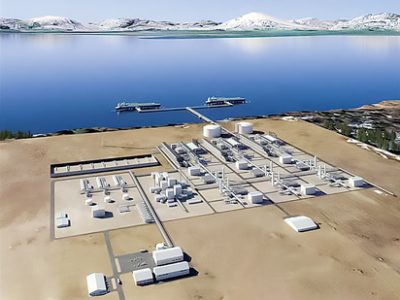Filing Challenges Trump Administration Approval of Alaska LNG Project
Rehearing Request Says FERC Ignored Impact on Climate, Endangered Wildlife

Environmental groups and an Alaskan Native village council filed a formal request Monday for the Federal Energy Regulatory Commission to reconsider its approval of the Alaska LNG project, which would export U.S. fossil fuel to Asia.
The appeal says the May 21 approval failed to consider the project’s impacts on climate change and endangered species, including polar bears, Cook Inlet beluga whales and North Pacific right whales.
The Alaska LNG proposal calls for an 807-mile pipeline, a facility to liquefy Arctic gas, and the shipping of about 20 million tons of the condensed fuel abroad every year. The rehearing request was filed by the Center for Biological Diversity, Earthjustice, Chickaloon Village Traditional Council, Northern Alaska Environmental Center and Sierra Club.
“It makes no sense to fuel climate change to export American fuel to Asia,” said Kristen Monsell, a senior attorney at the Center for Biological Diversity. “This risky project would be a disaster for our climate, Alaska and its endangered wildlife. FERC’s approval ignored climate change and federal law, and this decision needs to be reconsidered.”
The project’s pipeline would have a daily capacity of 3.3 billion cubic feet of gas. Burning that amount of gas could result in more than 76 million tons of carbon dioxide equivalent emissions annually. That’s almost the same global warming impact as building 20 coal-fired power plants.
“Even those who support this project should be appalled at how dismissively FERC has treated its numerous significant impacts on Alaska and the climate, telling the public essentially not to look behind the curtain,” said Erin Whalen, an attorney at Earthjustice. “The agency needs to scrap its order and start over.”
Today’s request cited comments by FERC Commissioner Richard Glick, who was appointed to the commission by President Trump in 2017, dissenting against the approval.
“The Commission once again refuses to consider the consequences its actions have for climate change,” Glick said. “Claiming that a project’s environmental impacts are acceptable while at the same time refusing to assess the significance of the project’s impact on the most important environmental issue of our time is not reasoned decisionmaking.”
The pipeline would connect drilling operations on the North Slope to an export terminal on Cook Inlet and bring tanker ships through the habitat of endangered North Pacific right whales and Cook Inlet beluga whales. FERC estimates the project would increase large vessel traffic in the Inlet by nearly 75%.
Alaska is currently warming at twice the global rate, and the state’s infrastructure is being compromised by thawing permafrost and related subsidence. The project, with a price tag of at least $43 billion, would also involve the construction and operation of a gas-treatment plant and associated 60-mile pipeline on the North Slope.
*
Note to readers: please click the share buttons above or below. Forward this article to your email lists. Crosspost on your blog site, internet forums. etc.

